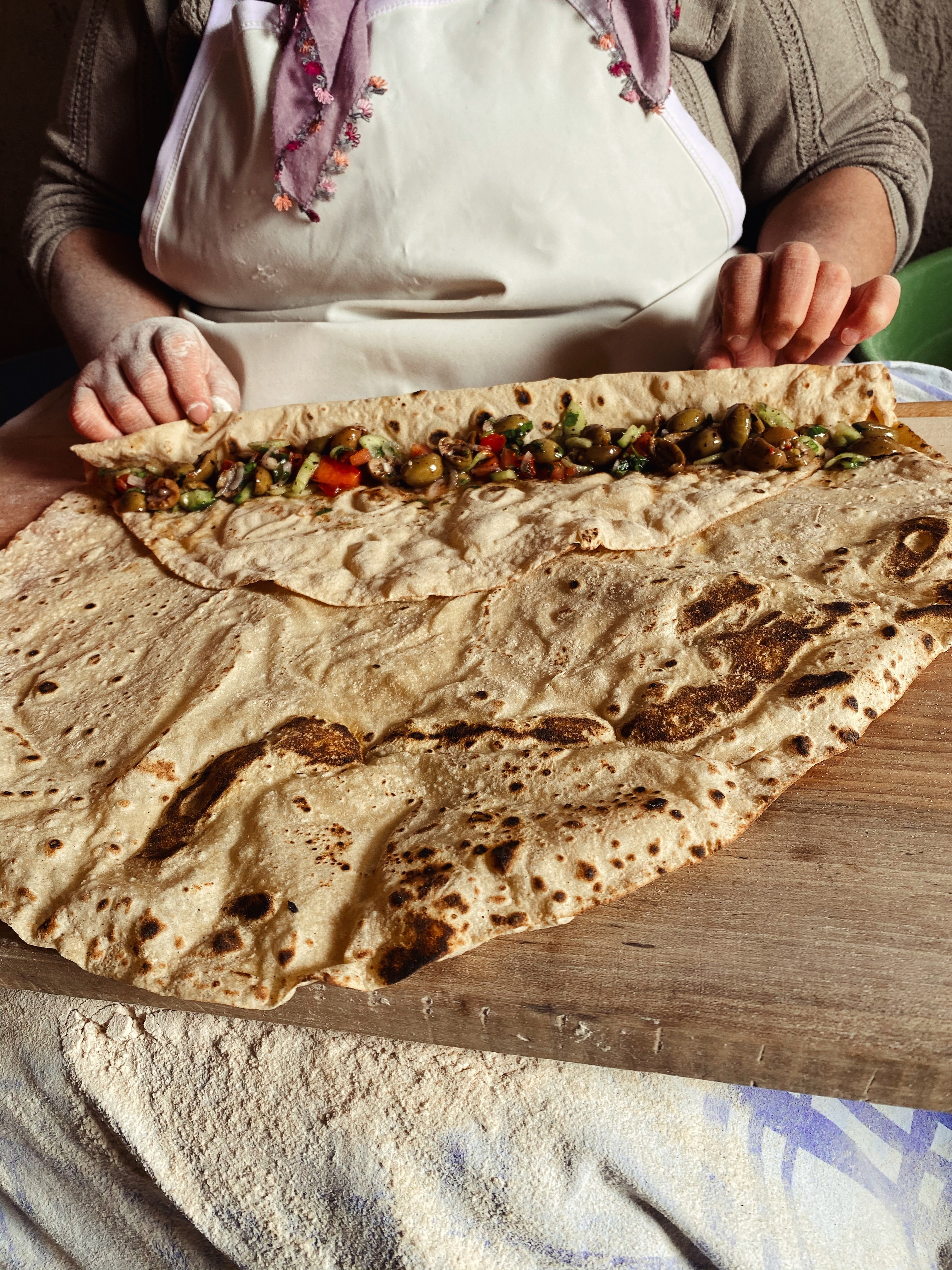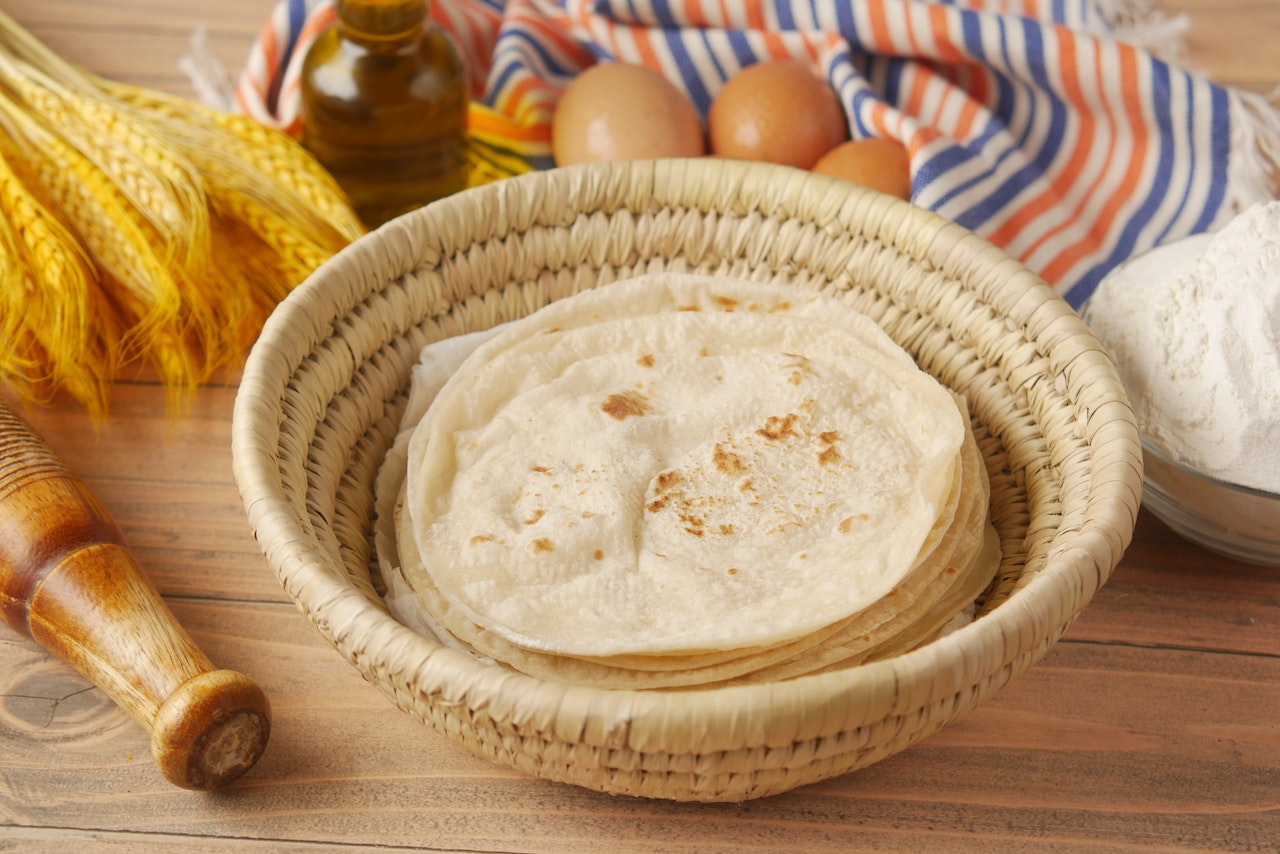That's correct! Injera is indeed a staple food in Ethiopian cuisine and is widely enjoyed throughout the country. It plays a significant role in Ethiopian dining traditions.
To prepare injera and the accompanying Ethiopian meal, you will need the following ingredients and follow these general steps:
Ingredients for Injera:
1-2 cups teff flour (you can find teff flour in specialty stores or online)
2-3 cups water (approximately)
3-Salt (to taste)
Ingredients for Accompanying Dishes (stews, vegetables, and meats):
1-Ethiopian spices such as berbere (a spice blend) or niter kibbeh (spiced clarified butter) for flavoring
2-Variety of vegetables like lentils, chickpeas, carrots, potatoes, cabbage, spinach, etc.
3-Meat options such as beef, lamb, chicken, or fish (optional for non-vegetarian dishes)
4-Onion, garlic, and ginger (common aromatics used in Ethiopian cuisine)
5-Oil or butter for cooking
6-Salt and pepper (to taste)

Injera:
1- In a large mixing bowl, combine the teff flour and water. Start with 2 cups of water and gradually add more until you achieve a pancake batter-like consistency. The batter should be smooth and free of lumps.
2- Add a pinch of salt to the batter and stir well. Cover the bowl with a clean cloth or plastic wrap and let it ferment at room temperature for 24 to 48 hours. The longer the fermentation, the more sour the injera will become.
3- After the fermentation period, the batter will have a bubbly texture. Give it a good stir to mix in the bubbles.
4- Heat a non-stick griddle or large pan over medium heat. You can lightly oil the surface if needed.
5- Pour a ladleful of the batter onto the hot griddle, tilting it in a circular motion to spread the batter evenly and form a thin, large round shape.
6- Cook the injera until the surface is covered with tiny holes and the edges begin to lift. It should take a few minutes. Avoid flipping the injera to cook the other side; it is typically only cooked on one side. Remove the injera from the griddle and let it cool on a clean cloth or plate. Repeat the process with the remaining batter.

Accompanying Dishes:
1- For the stews, heat oil or butter in a large pot over medium heat. Add finely chopped onions, minced garlic, and grated ginger. Sauté until the onions become translucent and the mixture is fragrant.
2- Add the Ethiopian spices like berbere or niter kibbeh to the pot and stir well to coat the aromatics. Adjust the amount of spice according to your taste and desired level of heat.
3- Add your choice of vegetables or meats to the pot and stir to combine. If using meat, ensure it is browned on all sides.
4- Pour in enough water or vegetable/meat broth to cover the ingredients and bring the mixture to a simmer. Reduce the heat to low, cover the pot, and let it cook until the vegetables or meats are tender and flavors meld together. This can take anywhere from 20 minutes to an hour, depending on the ingredients.
5- Season with salt and pepper to taste. Adjust the consistency of the stew by adding more water or broth if needed.

Serving:
1- Place a large piece of injera on a serving platter.
2- Ladle the stews, vegetables, and meats onto the injera, spreading them out in different sections.
3- Tear smaller pieces of injera to use as utensils. Use these pieces to scoop up the stews and enjoy the flavors together.

Here's the nutritional information for the ingredients listed:
Teff Flour (2 cups):
Calories: Approximately 820 calories
Carbohydrates: Approximately 168 grams
Protein: Approximately 32 grams
Fat: Approximately 6 grams
Water (3 cups):
Water does not contain any significant calories, carbohydrates, protein, or fat.
Salt:
Salt does not contribute significantly to calorie content, carbohydrates, protein, or fat.
Ethiopian spices (berbere or niter kibbeh):
The nutritional information for spices varies depending on the specific blend and quantity used. Generally, spices are low in calories, carbohydrates, protein, and fat.
Lentils, Chickpeas, Carrots, Potatoes, Cabbage, Spinach, etc. (variety of vegetables):
The nutritional content varies for each vegetable. Here's a general breakdown for 100 grams of each vegetable:
Lentils: Approximately 116 calories, 20 grams of carbohydrates, 9 grams of protein, and 0.4 grams of fat.
Chickpeas: Approximately 364 calories, 61 grams of carbohydrates, 19 grams of protein, and 6 grams of fat.
Carrots: Approximately 41 calories, 10 grams of carbohydrates, 1 gram of protein, and 0.2 grams of fat.
Potatoes: Approximately 77 calories, 17 grams of carbohydrates, 2 grams of protein, and 0.1 grams of fat.
Cabbage: Approximately 25 calories, 6 grams of carbohydrates, 1 gram of protein, and 0.1 grams of fat.
Spinach: Approximately 23 calories, 4 grams of carbohydrates, 3 grams of protein, and 0.4 grams of fat.
Meat options (beef, lamb, chicken, fish):
The nutritional content varies depending on the specific type of meat and its cut. Here's a general breakdown for 100 grams of each meat:
Beef: Approximately 250-300 calories, 0 grams of carbohydrates, 25-30 grams of protein, and 17-21 grams of fat.
Lamb: Approximately 250-300 calories, 0 grams of carbohydrates, 25-30 grams of protein, and 17-21 grams of fat.
Chicken (skinless, roasted): Approximately 165-195 calories, 0 grams of carbohydrates, 30-35 grams of protein, and 3-7 grams of fat.
Fish (varies depending on the type): Approximately 100-200 calories, 0 grams of carbohydrates, 15-25 grams of protein, and 2-15 grams of fat.
Onion, Garlic, and Ginger:
These aromatics are generally low in calories, carbohydrates, protein, and fat when used in moderate quantities.
Oil or Butter for Cooking:
The nutritional content depends on the type and quantity of oil or butter used. Here's a general breakdown for common options:
Olive oil: Approximately 120 calories, 0 grams of carbohydrates, 0 grams of protein, and 14 grams of fat per tablespoon.
Vegetable oil: Approximately 120 calories, 0 grams of carbohydrates, 0 grams of protein, and 14 grams of fat per tablespoon.
Butter: Approximately 100 calories, 0 grams of carbohydrates, 0 grams of protein, and 11 grams of fat per tablespoon.
Please note that these values are approximate and can vary based on the specific brands and preparation methods used.


Comments